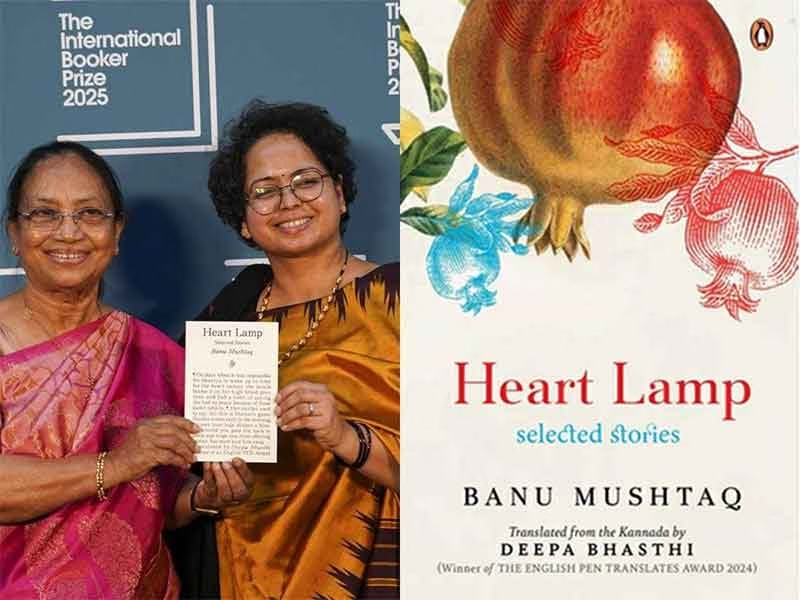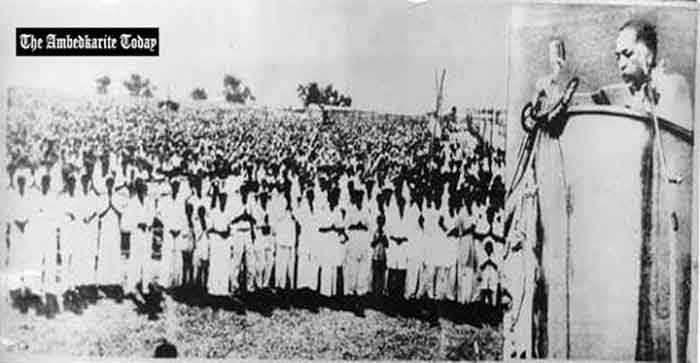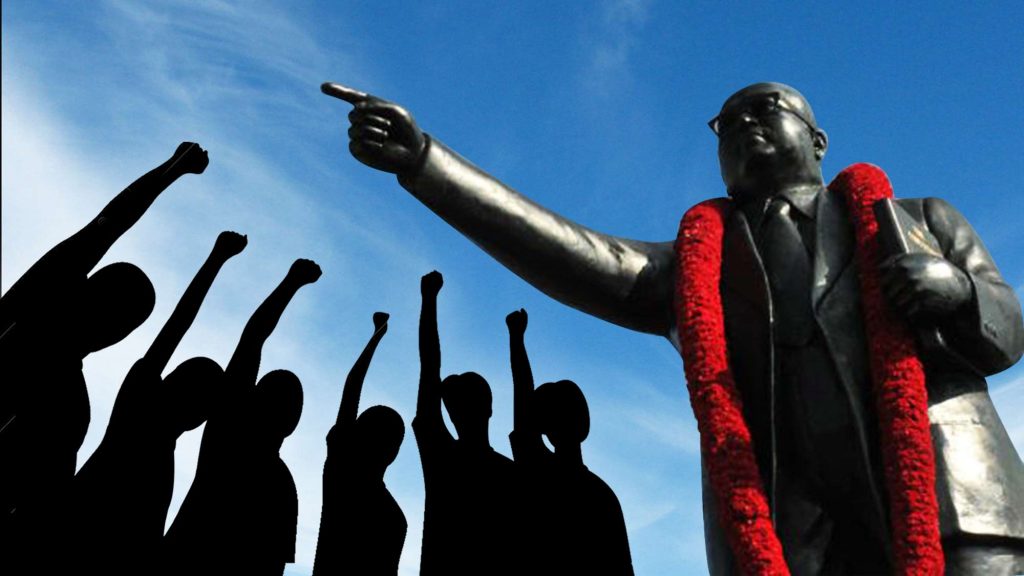
Every nation has had great personalities who have given humanity a new direction and played a leading role in its social, economic, educational, cultural, and political development. Among these towering figures, the name of Dr. Babasaheb Ambedkar stands tall. In most countries, marginalized, underprivileged, and socially excluded communities draw inspiration from his life and work. His birth anniversary is celebrated in nearly 150 countries. Recently, the Mayor of New York City, Eric Adams, officially declared April 14 as “Dr. B.R. Ambedkar Day” to be celebrated annually.
Dr. Ambedkar was born in a society where birth equated to deprivation, humiliation, and lack of opportunities. Yet, he did not accept this fate of subjugation and instead chose the path of struggle, transforming seemingly impossible goals into reality. He considered education the backbone of life and, through its power, brought about a social revolution.
His education at prestigious institutions like Columbia University (USA) and the London School of Economics is a testament to his immense determination and intellectual strength. There, he not only acquired knowledge but also raised fundamental questions in social, economic, and political thought—and sought answers to them. Upon returning to India, he devoted his knowledge, intellect, and efforts to the transformation of society.
Dr. Ambedkar’s courageous and clear-headed fight against untouchability and caste discrimination had a profound impact globally. He did not fight solely for the liberation of Dalits but dedicated his life to the equality of all humankind. “The recognition of human dignity and the need for equality” was the driving force behind his thoughts. Hence, his ideals align closely with the values of the French Revolution—liberty, equality, and fraternity.
While drafting the Indian Constitution, he carefully considered every section of society—Dalits, Adivasis (tribals), women, minorities, farmers, laborers, and the common citizen. The Indian Constitution is not just a legal document; it is a weapon of social revolution. The principles of equality, fraternity, and freedom enshrined in it remain the pillars of Indian democracy today.
Dr. Ambedkar’s ideas transcend national boundaries. Activists, social thinkers, and human rights advocates around the globe continue to study his philosophy. Movements such as the anti-apartheid struggle in Africa, the Black Lives Matter movement in the USA, the Dalit liberation movement in South Asia, and the Buddhist revival efforts all reflect his influence. In recognition of his intellectual legacy, Columbia University honored him as one of the top 100 global intellectuals. Statues of Dr. Ambedkar have been installed in cities like London, Tokyo, and New York—further evidence of his global stature.
“Educate, Organize, Agitate”—his three-fold mantra continues to guide millions of youth today. He took a firm stand on women’s rights, organized laborers, raised concerns about farmers, and presented a clear vision on issues like industrialization. He looked at religion, traditions, and customs with a rational eye and prioritized equality over blind faith.
In 1956, Dr. Ambedkar embraced Buddhism—not merely as a religious act, but as a symbol of social dignity and rebellion against oppression. Millions followed in his footsteps, initiating the Neo-Buddhist movement. His work “The Buddha and His Dhamma” is not just a religious text but a philosophical treatise envisioning a new society.
Today, when the world discusses inclusive development, human rights, social justice, women’s empowerment, and sustainable democracy, Dr. Ambedkar’s thoughts appear more relevant than ever. His writings and speeches continue to provide direction and serve as a precious source of inspiration—especially for the younger generation.
It is not enough to merely read or hear his thoughts—they must be internalized. As he once said, “My life is a struggle, and even after my death, my thoughts will continue to struggle in the world.” These words underline the timeless relevance of his philosophy.
Thus, Dr. Babasaheb Ambedkar is not just the pride of one nation, but a guiding light for the whole world. His philosophy is a beacon of hope for all humanity. Under his ideological guidance, the world can progress toward true equality, and hence, reflecting upon his work and ideas is the need of the hour.
Across the globe, his birth anniversary is commemorated with festivals, conferences, and symposiums. At the same time, within India, efforts are being made to downplay Ambedkarite ideology and his contributions. Instances of desecration of his statues by those opposing his philosophy continue to occur. Dr. B.R. Ambedkar (April 14, 1891 – December 6, 1956) was the Chairman of the Drafting Committee of the Indian Constitution, a renowned lawyer, India’s first Law and Justice Minister, a linguist, politician, economist, journalist, a pioneering voice against casteism and untouchability, a savior of the marginalized, and a staunch advocate of equality.
According to Dr. Ambedkar, no society can progress or develop without the social, economic, and political empowerment of women. Ambedkarism or Ambedkarite philosophy is the systematic expression of his ideas presented through newspapers, books, speeches, debates in the Constituent Assembly, and other platforms.
Ambedkarism continues to inspire everyone—from politicians to the most marginalized in society. It is an ideology that encompasses liberty, equality, fraternity, social, economic, and political justice, human dignity, secularism, democracy, socialism, and the empowerment of Dalits, tribals, women, farmers, and laborers. It advocates for the fulfillment of basic needs like food, shelter, clothing, education, health, the right to work, and equal pay for equal work. It also supports public control over key industries (nationalization), positioning itself against the current trends of liberalization, privatization, globalization, and corporatization. Among socialist thinkers, Dr. Ambedkar holds an important place.
Ambedkarism envisions a society where every individual has equal value in every sphere of life, free from narrow divisions of birth, caste, region, religion, language, and gender. Considering India’s diversity, Ambedkarism upholds the ideal of “unity in diversity” to promote social harmony and integration.
It stands against social inequality, injustice, untouchability, casteism, feudalism, capitalism, bureaucratic apathy, majoritarian tyranny, violent movements, and religious or theocratic states.
According to Ambedkarite thought, untouchability rooted in casteism is narrow-minded, divisive, and inhumane. It obstructs national unity and development. Dalits were subjected to humiliation due to untouchability, and without social revolution, exploitation, inequality, and degrading behavior would persist. Dr. Ambedkar advocated for the annihilation of caste.
Challenges facing Ambedkarism today include social discrimination and inequality, hero-worship in politics, casteism, crimes and violence against Scheduled Castes and Tribes, inhuman atrocities based on caste and color, administrative bias, and economic inequality.
In reference to the implementation of the Indian Constitution, Dr. Ambedkar once said, “On 26th January 1950, we are going to enter a life of contradictions. In politics, we will have equality—one person, one vote, one value. But in social and economic life, we will continue to deny the principle of one person, one value because of our social and economic structure. How long shall we continue to live this life of contradictions? If we continue to deny equality in our social and economic life, our political democracy will be in peril.”
Ambedkarism advocates for fostering goodwill among people of different castes, religions, cultures, regions, and languages. Given India’s vastness and diversity, nation-building must be strengthened on the foundation of “unity in diversity.”
Ambedkarism proposes an egalitarian society free from poverty, hunger, unemployment, and illiteracy as an alternative to the current system. It emphasizes social, economic, and political justice; public control of major industries; decentralization of wealth; and the empowerment of marginalized communities.
Subscribe to Our Newsletter
Get the latest CounterCurrents updates delivered straight to your inbox.
Vikas Meshram is a journalist















































